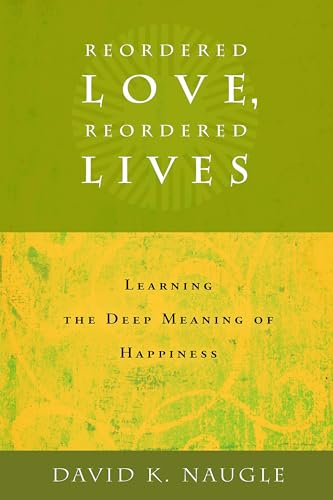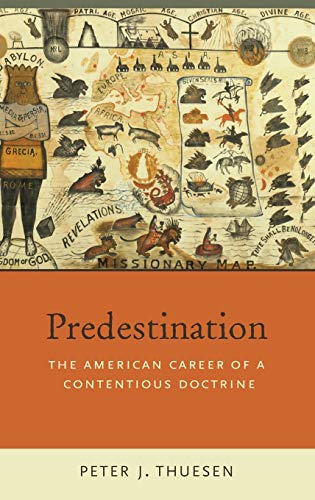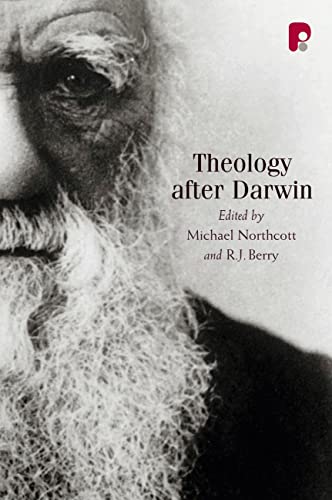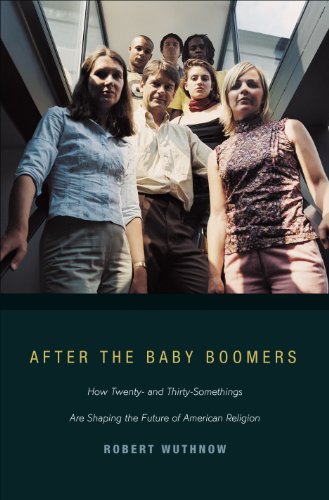Reordered Love, Reordered Lives: Learning the Deep Meaning of Happiness
Written by David K. Naugle Reviewed By Ted NewellDavid Naugle’s Worldview: History of a Concept (2002) is the major recent summary on integrating faith and learning in Christian university education. Now in Reordered Love, Reordered Lives, Naugle helps readers to distinguish between misbegotten driving forces and driving forces that lead to fully satisfying lives. Naugle focuses on right loves as the hallmark of a genuine Christian life. Naugle is alert to a surprising selection of popular, academic, and theological writers, but draws mainly from Augustine of Hippo (a.d. 354–430) to underwrite his project. Reordered Loves recovers an old emphasis that has been obscured, for Protestants at least, and makes it fresh.
Chapters 1–2 set the agenda. The first chapter justifies happiness as God’s goal for humanity from the Garden of Eden and, after the fall, through redemption. Though Christianity has been ambivalent about human happiness, genuine happiness is God’s wholeness, his shalom across six key dimensions of living. He rightly ordered the good created world, and people should genuinely appreciate it. Good loves enrich human life so that it is lived as should be. But the second chapter says, the world is far from the way it is supposed to be. The principle source of disorder is disordered loves. Bad loves distort lives. Since our loves drive us, loves not centered on the Creator must be centered on aspects of the creation, which can only distort lives.
Chapter 3 specifies bad loves and what they do. Naugle lists pride, envy, anger, sloth, greed, gluttony, and lust from monastic and medieval lists of seven deadly sins. Any of these underlying sin patterns is antithetical to love, while contrasting cardinal virtues incarnate it. Naugle is not the only recent writer to notice that the seven deadly sins and virtues challenge current culture with ancient insights. Os Guinness’s Steering through Chaos uses the seven deadly sins as its map, and recent popular culture in print, music, and film has used them to cast a jaded eye on the present day.
Chapters 4–5 are imaginative takes on justification and sanctification respectively from the perspective of the Christian life, continuing in chapter 6 with a picture of future redeemed life in worship and virtues. These chapters are conventional but unstuffy presentations that are well suited to university classes in introductory theology or Christian spirituality. The concluding chapter sums up the Christian life as anticipating redeemed, fully human, life in the pursuits of a calling and classic Christian disciplines.
This book is a wide-ranging restatement of the apologist Francis Schaeffer’s The Mark of the Christiansome four decades ago. Naugle was influenced by the Schaeffers’s L’Abri ministry, so his emphasis is not surprising. Though the main Protestant emphasis was on faith, specifically on justification, love as an outcome of the Christian life was never officially passé. After all, it is much in Scripture. But the restatement is necessary. Where the Catholic tradition understood justification as a lifelong process that involves holiness, the Protestant Reformers Luther and Calvin saw justification as an act by which God changes a person root and branch. The changed life would necessarily bring forth acts of love, as a good tree produces good fruit. For Protestants, right standing with God is verified less by the evidence of a holy life than by believing right propositions. In the Protestant context, listing specific virtues might have seemed likely to lead people to imagine them as ways of salvation. Given the Protestant eclipse of love, it is not surprising that Naugle’s sources, such as C. S. Lewis or G. K. Chesterton, tend to be Catholic or Anglo-Catholic.
Taking Reordered Love with James K. A. Smith’s Desiring the Kingdom (2009), one might ask whether evangelical Protestants in university settings are struggling with the limitation of the life of the mind in generating whole-person and social transformation. Nicholas Wolterstorff’s writings on Reformed Christian education over four decades have stressed that much more than right cognition is the desirable outcome. Now Naugle, going to the roots of the Western Christian tradition, stresses that the life of the mind must be directed and fulfilled by right loves. Possibly these evangelical thinkers are feeling toward a greater embodiment of the faith that can express a communal Christian story in contrast with the powerful modern social imaginary.
Ted Newell
Ted Newell
Crandall University
Moncton, New Brunswick, Canada
Other Articles in this Issue
Most of us, I suspect, develop fairly standard ways, one might even say repetitive ways, to appeal to the motivations of our hearers when we preach the gospel...
How to Write—and How Not to Write—A Review: An Appreciative Response to Reviews of Ancient Near Eastern Themes in Biblical Theology by Dempster and Edgar
by Jeffrey J. NiehausI want to thank Themelios for the unusual opportunity to interact with two reviewers of my book Ancient Near Eastern Themes in Biblical Theology...
Parallels, Real or Imagined? A Review Article of Jeffrey J. Niehaus, Ancient Near Eastern Themes in Biblical Theology
by William EdgarWhen I came to Westminster Theological Seminary in Philadelphia as a young student in the 1960s, two things struck me...
Why Evangelicals Should Ignore Brian McLaren: How the New Testament Requires Evangelicals to Render a Judgment on the Moral Status of Homosexuality
by Denny BurkIn 2006 on Christianity Today’s leadership blog, Pastor Brian McLaren urged evangelical leaders to find a “Pastoral Response” to their parishioners on the issue of homosexuality...
A Member of the Family or a Stranger? A Review Article of Jeffrey J. Niehaus, Ancient Near Eastern
by Stephen DempsterWe cannot overstate how important knowing the context is for understanding the significance of any communication, whether that is a simple word, sentence, paragraph, larger text, sign, photograph, or cultural cue...






